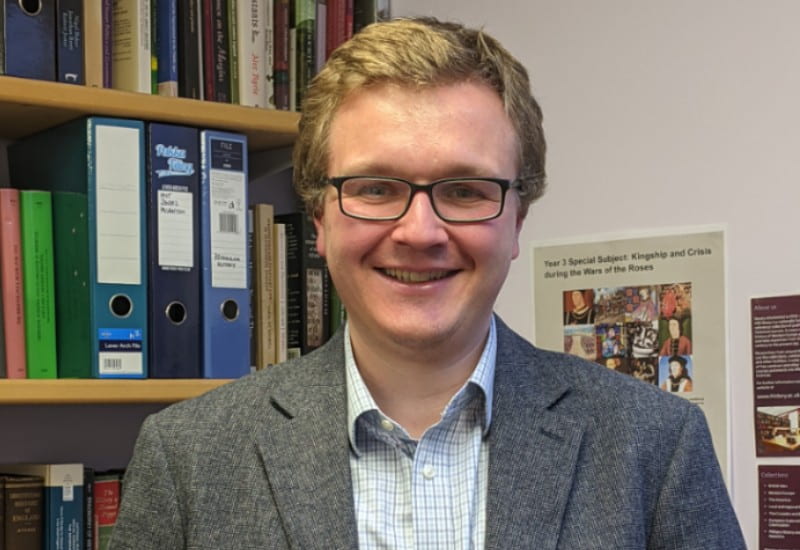For over 12 years Dr John Reeks has been a part of the University of Bristol: first as an MA student, then as a PhD researcher and now as a lecturer in the Department of History. Here he tells us more about what makes the University such a special place for him.
I’m a local boy who grew up on a farm in the Forest of Dean, where I still live now with my wife and baby. It’s a small family farm and we have a few horses, a couple of yappy Jack Russells and a herd of suckler cows. Farmers’ kids always seem very reluctant to move away from their farms and I’m no exception. So I’ve always felt phenomenally lucky to have a university like Bristol as my local university.
A working day for me is always busy – invigoratingly busy – and it begins with a very early start in order to get to Bristol in good time. Pre-pandemic the University would be buzzing with a mass of people marching off to lectures and seminars at ten to the hour. Every time you make that movement your heart rate goes up and you start to get a bundle of nervous energy. Then you get one of the greatest privileges of all: to be able to have a fascinating conversation with a group of very intelligent people, hear their ideas and debate with them.
I first arrived at the University of Bristol in 2008 to undertake an MA in Medieval and Early Modern History under the supervision of Professor Ronald Hutton. I fondly remember attending the department’s weekly research seminars as an MA student, where you’d hear about an interesting new paper or research project. They were some of my favourite moments – staying after formal teaching had ended and enjoying a glass of wine as it was starting to get dark outside.
After I completed the MA I knew that I wanted to pursue doctoral research but I wasn’t in a position to self-fund three or four years of study. I applied for the Keil Scholarship, a fund which was set up by the late Dr Ian Keil (BA 1955, PhD 1965), himself a historian who studied at the University of Bristol. Ian sadly died in 2012, and since then his wife Mrs Teresa Keil has continued the Keil Scholarship in his memory, which is a real testament to their generous natures. The scholarship enabled me to embark on a PhD on parish religion in the mid-17th century, using the records kept by church wardens to understand more about that period of our history. I don’t think it’s possible to express in words how important people like the Keils are to the University – their support changes lives and allows people to pursue the things that they are most passionate about.
I try to bring the history of the University into my teaching whenever I can because I think it’s really important for our students to have a sense of place and an understanding of the institution. While I was conducting this research, I was delighted to find Ian Keil’s name in the Arts Faculty minutes book. He joined the department in November 1955 under the supervision of Charles Ross, the great medievalist. I noticed that he himself received a scholarship, which enabled him to take on full-time research at Bristol. It was very moving to discover that and to know that when he was in a position to do so, Ian Keil went full circle and gave that opportunity to someone else.
Since I joined for my MA, the University – and certainly the Department of History – has changed a great deal. In our department, student and staff numbers have doubled but we’ve managed to maintain a close sense of community. Last year, of course, because of the pandemic we had to adapt to teaching online and it would be truthful to say that it was a challenging process. Over the summer we had to completely overhaul the curriculum, which required a huge amount of hard work. But we’ve been able to continue to deliver teaching in the most extreme circumstances, which I’m really proud of.
That being said, I’m really looking forward to getting back to in-person teaching in the future; the excitement that comes with getting people in a room together talking face to face is something that you can’t replace. Lecturing is a performance piece, it requires energy, it requires you to use your body and your voice in a way that keeps people engaged and that is best conveyed in a certain type of place. If you take the Tyndall Lecture Theatre in the Physics Building for example, it has a huge blackboard at the back and it always smells of chalk dust. It has these amazing acoustics and a stage that you can march around as you’re delivering your material. It feels like you could be giving your lecture in 2021 or back in 1928 when it was built and it’s perfect for the theatre of a lecture.
I’m fortunate to work in one of the best departments of History in the country, if not the world. It’s friendly, collegial and respectful and that has a massive bearing on the way that we teach our students. What keeps me enthused and energised on a day-to-day basis is my colleagues and the way that we work with and support one another. That’s something that’s always made me love the University and it’s one of the reasons why I hope to stay here for many more years to come.

